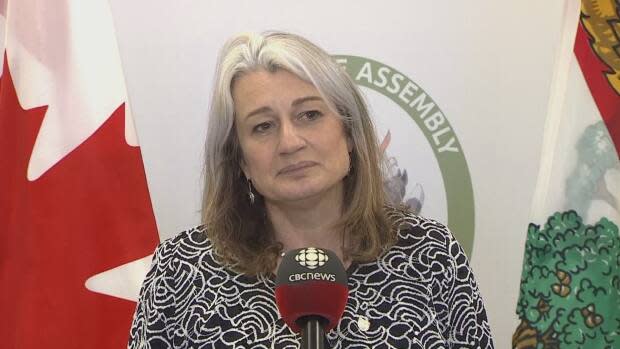P.E.I. government would intervene if Maritime Electric follows through with $91M combustion turbine

The P.E.I. government says it's ready to intervene if Maritime Electric follows through on purchasing a $91-million combustion turbine it has forecasted in its capital budget application.
Questions around the generator came up during question period Thursday, as Green MLA Hannah Bell asked the province what it plans to do about it.
"Are you going to step in and stop this planned investment, or do you support using $90 million of Islanders' money on a new fossil fuel power plant?" Bell asked.
"We'll 100 per cent step in," responded Environment, Energy and Climate Action Minister Steven Myers. "There is no way, as long as I sit in this chair, that there's going to be any more fossil fuels burned on the Island."
The electric utility included it in it's capital budget to IRAC, forecasted for 2026 and 2027, spending of $45,020,000 and $46,371,000 over the two-year period.
IRAC commissioned an independent energy firm out of Boston to review Maritime Electric's capital budget application as well as the utility's integrated system's plan. It concluded that the generator, which it said would exist at the soon-to-be-decommissioned Charlottetown Thermal Generation Station, is not necessary.
It recommended Maritime Electric to pursue electric battery storage.
"The need for a new [combustion turbine] at CTGS is not at all a reasonable assumption at this stage. [Maritime Electric] must do a full economic assessment of resource options that include on-Island utility-scale (or distributed) battery storage," Synapse Energy Economics said.
"P.E.I. is a potentially attractive option for battery installation at this time."
'Absolutely no sense'
Maritime Electric spokesperson Kim Griffin said that generator is a "placeholder" in the capital budget, as the utility has to forecast costs five years in advance. She also said Maritime Electric has not applied to buy the generator.
Griffin said the utility is releasing a consultant's study in the new year, that will help address future needs for the Maritime Electric like generators and the electrical grid's capacity.
What has already been released by Maritime Electric is a sustainability report earlier this year, with the target to reduce greenhouse gas emissions by 55 per cent by 2030.

With a $91-million combustion turbine (generator) budgeted for 2026/2027, Bell questioned how that fits into P.E.I.'s overall march toward net-zero by 2040.
"A brand new diesel generator as a future investment makes absolutely no sense," Bell told CBC News.
"We are on a path to net-zero, we have targets to reach within the next eight years. The idea that we would spend that huge amount of money that is something completely on fossil fuel … makes no sense."
Myers said much the same, adding that the province has first right to refusal — giving government the power to axe the generator if it ever came down to it.
"When staff brought it to my attention, I said 'No it can't happen' and they all agreed," he said. "There is nobody in our office that thinks this is a good idea."
Province's vision is for 'micro-grids'
It's expected that by 2030 the demand on P.E.I.'s electric grid is going to double, Myers said. The infrastructure demand will be met by government, he said, which plans to invest and build for that.
Bell said P.E.I. needs to find better ways to "future proof" its electric grid, and that cleaner technology like battery storage is what companies like Maritime Electric should be investing in — instead of a $91-million massive infrastructure project.

"What we don't want to see are big, big long-term investments," she said. "I'm OK with a short-term investment because that's about quality of life, which always has to come first, but we have to think carefully about a short-term bridge and a long-term anchor," she said.
Myers said a more feasible option in the future is to see more homes make the switch to renewable energy and options for power storage is what the province has prioritized next.
"We have to look at how do we enable DC inverters so people can put the power back into their home? And how do we enable home micro-grids with their own storage," he said.
"That's the next step that you're going to see us take. If you already have solar, then we have to have a program in place to allow you to have a DC inverter and storage.
"That's where our vision is in the next two years."


